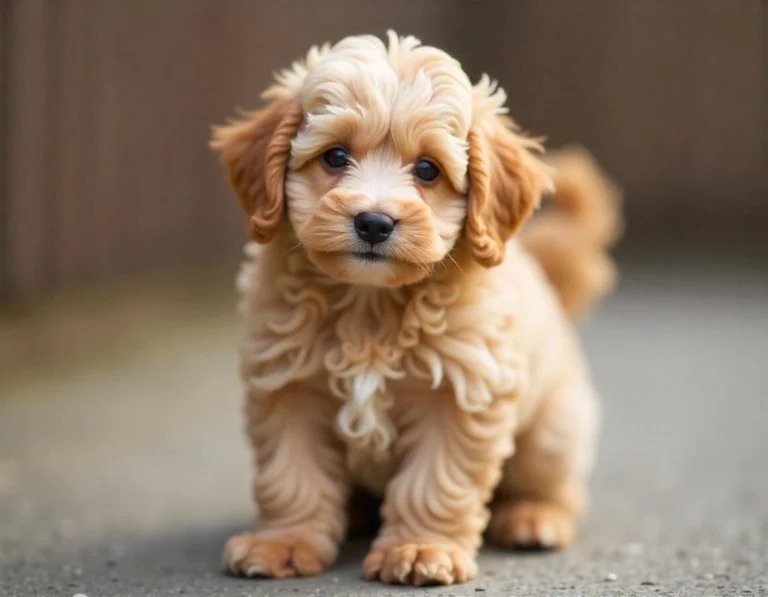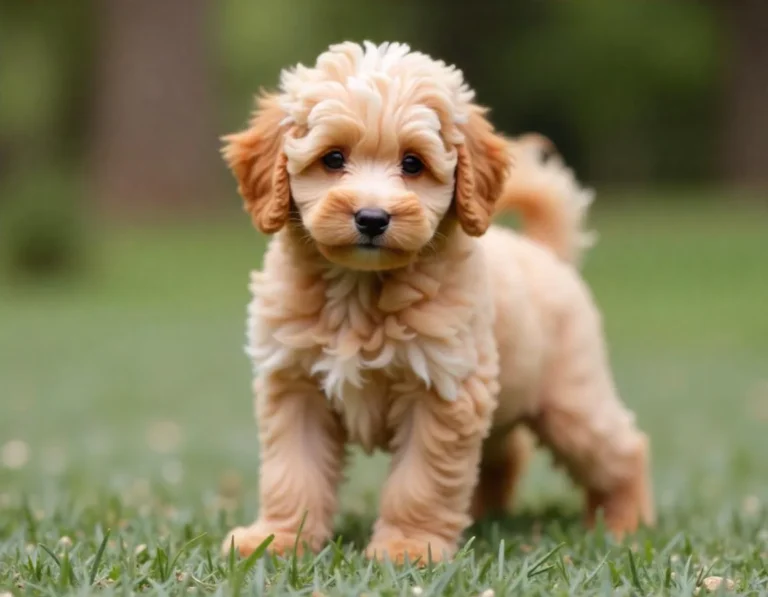The Miniature Poodle is a small, smart, and energetic breed that makes a wonderful companion for many types of families. Before bringing one home, it’s important to understand their temperament so you can provide the right care and training. These dogs are known for their intelligence, making them easy to train, but they also require mental stimulation to stay happy. They are playful and love to be part of family activities, always eager to engage and show affection. Understanding the Miniature Poodle temperament helps ensure you’re prepared for a pet that is both loving and active, with a need for companionship and attention.
Table of Contents
Miniature Poodle Behavior Problems

Miniature Poodles are loving and playful dogs, but like all breeds, they can develop behavior problems if their needs are not met. Understanding the Miniature Poodle temperament can help you address common issues such as barking, separation anxiety, and destructive behaviors.
Barking Tendencies
Miniature Poodles are naturally alert and may bark to get attention, alert you to strangers, or express boredom or anxiety. Their barking can become excessive if these needs are not addressed properly.
- Why do Miniature Poodles bark? Miniature Poodles tend to bark when they’re feeling alert, bored, or anxious. They are often very vocal because they want to communicate with their family or let you know something’s happening around them.
- How to manage excessive barking: Reducing excessive barking involves understanding the cause. If your dog barks from boredom, ensure they get enough mental and physical exercise. If they bark due to alertness, training them to stay calm when strangers are nearby can help.
- Training techniques to reduce barking: Consistency is key when training your Miniature Poodle. Teach them commands like “quiet” and reward them for stopping barking. Positive reinforcement, like treats and praise, will help encourage calm behavior.
Separation Anxiety
Miniature Poodles are very attached to their owners and can suffer from separation anxiety when left alone. This can lead to destructive behavior, including excessive barking, chewing, and pacing.
- Why Miniature Poodles may suffer from separation anxiety: The Miniature Poodle temperament is often very affectionate and dependent on their family. When they are left alone, they may become anxious and show signs of distress, such as whining or pacing.
- Early socialization and strategies to alleviate anxiety: To help your Miniature Poodle handle time alone, start socializing them early. Gradually get them used to being by themselves in a safe space for short periods, slowly increasing the duration. Providing puzzle toys or interactive games can also help keep their mind occupied and reduce anxiety.
Destructive Behavior
Without enough exercise and mental stimulation, your Miniature Poodle might develop destructive behaviors like chewing, digging, or scratching. These behaviors are often a result of boredom or pent-up energy.
- The importance of exercise and mental stimulation: Miniature Poodles are an active breed that requires both physical and mental activity to stay healthy and happy. Regular walks, playtime, and training sessions are essential to keep them busy and prevent destructive habits.
- Common behaviors: Miniature Poodles may chew on furniture, dig in the yard, or scratch at doors if they are not given enough stimulation. These behaviors are often signs of boredom or stress.
- How to prevent destructive tendencies: Providing regular exercise and mental challenges will help prevent destructive behavior. Offer chew toys, engage them in fun training games, and make sure they get enough outdoor activity to burn off excess energy.
Miniature Poodle Temperament Protective

Miniature Toy Poodles may be small in size, but they have a strong protective instinct that makes them natural watchdogs. Understanding how this behavior works is important for new owners, as it helps in managing their protective nature while also ensuring they are well-behaved in various situations.
Protective Instincts
Miniature Poodles are alert and attentive dogs, often acting as natural guardians for their families. This protective instinct is a key part of the Miniature Poodle temperament.
- The Miniature Poodle as a Natural Watchdog
Despite their small size, Miniature Poodles have a strong instinct to protect their family and home. They are highly alert to changes in their environment and will often bark to alert you to any potential danger, like a stranger approaching or an unusual noise. This makes them good watchdogs, even though they are not as intimidating as larger breeds. - How Their Protective Instincts Manifest
A Miniature Poodle’s protective nature usually shows itself in their alertness. They may bark loudly at unfamiliar sounds, people, or animals. Some may even take on a guarding role, positioning themselves between their family and what they perceive as a threat. While this behavior can be helpful, it can also lead to overreaction in certain situations if not properly managed. - Balancing Protective Behavior with Socialization
While the protective instincts of a Miniature Poodle can be beneficial, it’s important to balance these tendencies with proper training and socialization. Overprotectiveness can cause unnecessary stress for both the dog and the owner. Socializing your Poodle with different people, pets, and environments helps them understand what’s normal and what’s a true threat, reducing the chance of aggressive or excessive guarding behavior.
Protective Nature in Small Dogs
Small dogs, including the Miniature Poodle, often have a strong sense of protectiveness. This can sometimes be more noticeable because of their smaller size and eagerness to compensate for it.
- Why Small Dogs Like Mini Poodles Often Exhibit Strong Protective Instincts
Small dogs are often more alert and aware of their surroundings because they feel the need to protect themselves and their family. Miniature Poodles, despite their size, are naturally brave and will stand up to anything they perceive as a threat. Their instinct is to guard their territory, making them particularly protective of their home and family. - Addressing Overprotectiveness and Aggression
Sometimes, a Miniature Poodle’s protective instincts can lead to overprotectiveness or even aggression if not managed properly. If they’re not properly socialized or trained, they may react aggressively towards strangers, other animals, or unfamiliar situations. It’s important to address these behaviors early, using positive reinforcement and consistent training to teach your dog when it’s appropriate to be protective and when to remain calm. - The Role of Early Socialization in Controlling Protectiveness
Early socialization is key in controlling the protective instincts of your Miniature Poodle. The more they are exposed to different people, places, and experiences, the better they will be at distinguishing between real threats and harmless situations. By properly socializing your Poodle from a young age, you help them learn that not every new person or situation is something to guard against. This reduces the chances of overprotective behavior and helps your dog grow into a well-balanced, confident companion.
Miniature Poodle Temperament Protective | Male vs Female

When considering the Miniature Poodle temperament, it’s helpful to understand how the breed’s protective instincts can differ between males and females. Both male and female Miniature Poodles are protective, but their behavior and tendencies can vary in some ways. Whether you choose a male or female Miniature Poodle, knowing how to channel these instincts in a positive direction is key to having a well-balanced pet.
Protective Traits of Male Miniature Poodles
Male Miniature Poodles often have strong protective instincts. They can be more assertive in guarding their family and territory.
- Are Male Mini Poodles More Protective Than Females?
In general, male Mini Poodles tend to show a more dominant or assertive protective behavior compared to females. This doesn’t mean they are always more protective, but they may be quicker to act as a watchdog and take on a more “guarding” role when it comes to protecting their family and home. - Male Behavioral Characteristics and Their Protective Tendencies
Male Mini Poodles are often more vocal, especially when they sense something unfamiliar or threatening. They may bark loudly to alert you of a potential danger or try to assert their presence to keep strangers away. They are also more likely to take charge when it comes to guarding their home or family members. - How to Channel Their Protective Instincts in a Healthy Way
While it’s natural for male Mini Poodles to be protective, it’s important to ensure that they don’t become overly aggressive or anxious. Proper training and socialization from an early age can help manage these instincts. Teaching them when it’s appropriate to protect and when to relax can ensure they grow up to be confident and well-behaved dogs.
Protective Traits of Female Miniature Poodles
Female Miniature Poodles also have protective instincts, though they often express them differently from males.
- Female Mini Poodles’ Approach to Protectiveness
Female Mini Poodles are generally more reserved in their protective behavior. While they are still protective of their family, they may take a more cautious or quiet approach compared to males. They are often more focused on observing a situation rather than immediately reacting. - Key Differences in Behavior Compared to Male Mini Poodles
One key difference is that females tend to be less dominant in their protective behavior. They may show their protectiveness through body language, such as staying close to family members or quietly watching over their territory. Female Mini Poodles are also less likely to bark aggressively or challenge threats head-on, unlike their male counterparts. - Strengths of a Female Mini Poodle in a Family or Therapy Setting
Due to their more gentle and nurturing nature, female Miniature Poodles often excel in family settings or therapy roles. They tend to be more intuitive and sensitive to their owners’ emotions, making them great companions for individuals who need emotional support. Their protective instincts can also help provide a sense of security without becoming overwhelming or aggressive.
Mini Toy Poodle for Sale
If you’re considering bringing a Mini Toy Poodle into your home, understanding the Miniature Poodle temperament is essential for a successful relationship. Known for their intelligence, energy, and affectionate nature, these small dogs are excellent companions, but they require regular mental stimulation and socialization to thrive. At Toy and Poodle Puppies, we believe that understanding the Miniature Poodle temperament is key to addressing common behaviors such as excessive barking, separation anxiety, and protective instincts. While these dogs are playful and eager to be part of family activities, they can also develop destructive tendencies if their physical and emotional needs are not met. By providing proper training, exercise, and socialization, you can ensure that your Miniature Poodle grows up to be a well-behaved, loving companion.
Conclusion
Understanding the Miniature Poodle temperament is essential for ensuring a happy and harmonious relationship with your new pet. These intelligent, playful, and affectionate dogs make wonderful companions, but they require proper training, exercise, and socialization to thrive. At Toy and Poodle Puppies, we emphasize the importance of meeting your Miniature Poodle’s physical and emotional needs to prevent common issues like excessive barking, separation anxiety, and destructive behaviors. With the right care and attention, your Miniature Poodle will grow into a well-behaved, loving member of the family, ready to bring joy and companionship for many years to come.
FAQs
Are Miniature Poodles Good With Children?
Yes, Miniature Poodles are generally great with children. They are playful, affectionate, and enjoy being part of family activities. However, it’s important to supervise interactions with very young children to prevent any accidental rough handling.
How Do I Stop My Miniature Poodle From Barking Excessively?
To manage excessive barking, first identify the cause—whether it’s boredom, anxiety, or alertness. Providing mental stimulation, physical exercise, and consistent training can help reduce unnecessary barking.
Do Miniature Poodles Have Separation Anxiety?
Miniature Poodles are known to bond closely with their owners, which can lead to separation anxiety if they are left alone for too long. Gradual desensitization to being alone and providing interactive toys can help ease their anxiety.
How Much Exercise Does A Miniature Poodle Need Daily?
Miniature Poodles are an energetic breed and require at least 30 to 60 minutes of exercise daily, such as walks, playtime, or training. Regular exercise helps prevent boredom and destructive behavior.
Do Miniature Poodles Get Along With Other Pets?
Yes, Miniature Poodles typically get along well with other pets, especially if they are properly socialized from a young age. Early exposure to different animals helps them develop positive relationships with other pets in the household.
Are Male Or Female Miniature Poodles More Protective?
Male Miniature Poodles tend to show a more assertive protective nature, while females may be more reserved but still protective. Both genders can be loving and protective, but training and socialization are key to managing their behavior.








